Unleashing Joy: The Ultimate Guide to Chinchilla Care
Welcome to the wonderful world of chinchillas! These adorable, fluffy creatures are becoming increasingly popular pets due to their unique charm and relatively low maintenance. However, owning a chinchilla comes with significant responsibilities. This guide aims to provide you with all the necessary information to ensure your chinchilla lives a happy and healthy life.
Understanding Your Chinchilla
Chinchillas are native to the Andes Mountains in South America, where they live in high-altitude areas with cool climates. They are social animals that thrive in pairs or small groups, but can also be kept as solitary pets if provided with ample attention and stimulation. Their dense fur coats, which require specific care, make them distinct from other rodents.
Dietary Needs
A balanced diet is crucial for your chinchilla’s well-being. In the wild, they primarily eat grasses and shrubs. As pets, their diet should consist mainly of hay, supplemented by commercial pellets specifically formulated for chinchillas. Fresh water should always be available, and occasional treats like raisins or dried rose hips can be offered in moderation.
Never feed your chinchilla sugary or starchy foods, as these can cause digestive issues. Additionally, avoid giving them anything that could get stuck in their teeth or block their esophagus.
Habitat Setup
The right environment is key to keeping your chinchilla comfortable and healthy. Start by choosing an appropriately sized cage—bigger is better. Ensure it has multiple levels and enough space for your pet to move around freely. Wire flooring is ideal, as it allows droppings to fall through, reducing odors and making cleaning easier.
Provide plenty of bedding material, such as paper-based products or aspen shavings, ensuring no cedar or pine, which can irritate your chinchilla’s respiratory system. Include hiding spots, tunnels, and toys to stimulate their natural behaviors.
Grooming Needs
Chinchillas have incredibly dense fur, which requires regular dust baths to keep clean. Offer a shallow container filled with special chinchilla dust at least three times per week for about 15 minutes each session. This helps remove oils and dirt from their coat without causing harm.
Brushing isn’t typically needed unless there are tangles, but always check for any signs of matting after dust baths. Regular nail trimming may also be necessary; consult a veterinarian if unsure how to proceed safely.
Exercise Requirements
Despite their small size, chinchillas need regular physical activity to stay fit and mentally stimulated. Allow supervised playtime outside the cage daily, providing opportunities for running, jumping, and exploring new environments.
Interactive toys designed for small animals can encourage exercise within the cage. Rotate these items periodically to maintain interest and prevent boredom.
Common Health Issues
Like any pet, chinchillas are susceptible to certain health problems. Dental issues are particularly common, often caused by improper diet or genetics. Signs include difficulty eating, weight loss, or drooling. Regular visits to a vet who specializes in exotic animals can help catch these early.
Respiratory infections can occur due to poor air quality or stress. Look out for sneezing, runny nose, or labored breathing. Always quarantine new additions to your household until they’ve been checked by a professional.
Bonding with Your Chinchilla
Building trust takes time and patience. Begin by allowing your chinchilla to become accustomed to your presence through quiet observation. Gradually introduce gentle handling sessions, rewarding positive interactions with treats or praise.
Spending quality time together each day strengthens your bond. Play interactive games, offer enrichment activities, and simply enjoy their company. Remember, respect their boundaries; some chinchillas prefer less physical contact than others.
Maintaining Happiness
To keep your chinchilla happy, focus on providing a stimulating environment rich in mental and physical challenges. Rotate toys regularly, offer different types of enrichment, and engage in regular play sessions. Pay attention to changes in behavior, as this might indicate underlying concerns.
Ensure your chinchilla feels safe and secure in its home. Establish routines and provide consistent care, which contributes to overall contentment. By understanding and addressing their needs, you’ll foster a strong relationship built on mutual respect and affection.
Conclusion
Owning a chinchilla is a rewarding experience full of joy and companionship. With proper care, attention to dietary needs, suitable housing, appropriate grooming practices, adequate exercise, awareness of potential health risks, and efforts towards building a strong bond, you can ensure your chinchilla leads a long, healthy, and happy life.
We hope this guide has equipped you with the knowledge needed to provide excellent care for your chinchilla. Remember, every chinchilla is unique, so observe closely and adapt accordingly. Enjoy the journey of raising one of these delightful creatures!
